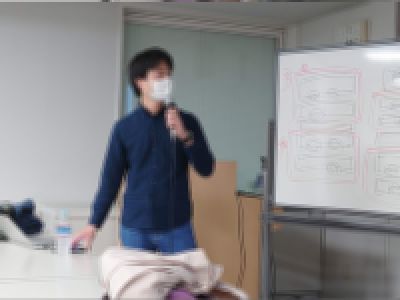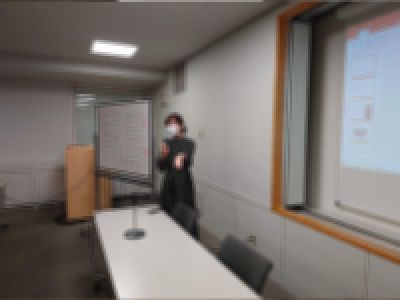::::::::::::::::::::::::::::::::::::::::::::::::::::::::::::::::::::::::::::::::
《今回のworkshop 》
○workshop参加人数:16名(うち新人の方:1名)
○【前半】:Naomi Osaka and Black Lives
Matter (BLM)?
○【後半】:Do you want to take a
vaccine?
:::::::::::::::::::::::::::::::::::::::::::::::::::::::::::::::::::::::::::::::::

≪FIRST HALF≫
<Agenda>“Naomi Osaka and Black Lives Matter (BLM)?”
This year in September, a big, bright news has spread all across Japan. Naomi Osaka became the 2020 US open champion. It was her second time to became the US Open champion after the 2018 US Open. But this time, her victory was not only for her but also for black people who were killed by police officers in the US. In her seven matches of the tournament, she wore a different face mask with the names of seven black people killed by police officers or racists. One name was George Floyd. On May 25, 2020, he was killed by excessive violence from police officers when he was arrested. The scene of police violence was filmed and the video spread across the country immediately. This incident triggered a big protest and Black Lives Matter movement became recognized widely. Millions of people joined this protest and Naomi Osaka was one of them.
BLM movement focuses on “Institutional racism” or “Systemic racism”. You may think that racial discrimination is personal bias or prejudice. However, racial discrimination is embedded in the social system and this is called “Institutional racism” or “Systemic racism”. For example, black people are more likely to be regarded as potential criminals and killed by police than white people. Also, many of the inhabitants in poor districts are black people, and the budget for social services such as education or medical care is not enough there. So, they cannot escape from the vicious cycle of poverty and social inequality is fixed.
Going back to Naomi Osaka, two commercial advertisements featuring Naomi Osaka released during the 2020 US Open and became a controversial issue in Japan. One is from Nisshin foods and its advertisement emphasizes her cuteness and ignored her protest action. In contrast, Nike’s advertisement supports her protest and showed an attitude against racism. In Japan, generally speaking, athletes are not encouraged to speak up about social or political issues. Many athletes are scared of losing sponsors by expressing their personal beliefs so they choose to keep silent. However, she spoke out against injustice. What do you think about her action?
・Questions
1. Did you know anything about BLM? What was your first impression of BLM?
2. Do you think racism against black people exists in Japan? And why or why not?
3. Is there any example of socially embedded discrimination in Japan?
4. Do you think athletes should speak more about social or political issues in public? And why or why not?
・References
<Must>
Naomi Osaka | US Open 2020 Winner’s Speech
<Must>
Number of U.S. blacks killed by police hard to pin down with no official figures
https://www.cbc.ca/news/trending/number-of-black-people-killed-by-us-police-still-no-stats-1.3670513
<Optional>
THE OTHER PANDEMIC: SYSTEMIC RACISM AND ITS CONSEQUENCES
<Optional>
白人警官はなぜ黒人を殺害するのか 日本人が知らない差別の仕組み
https://www.jiji.com/jc/bunshun?id=38288
<Optional>
いま、理解しておくべき「ブラック・ライブズ・マター」の背景
https://shiruto.jp/global/2296/
<Optional>
大坂なおみ、かわいいだけ? 差別反対には黙る日本企業
https://www.asahi.com/articles/ASN9Y71S8N9SUTIL01C.html
<Optional>
大坂なおみが語った「スポンサー企業失う恐怖」 企業側はどう答えた?
https://www.huffingtonpost.jp/entry/story_jp_5f6da227c5b64deddeebe031
≪LATTER HALF≫

<Agenda>“Do you want to take a vaccine?”
Since the pandemic of COVID-19 started in early 2020 or earlier, we have been in this pandemic for nearly a year. Unlike seasonal flu and temporal outbreaks of measles and rubella, COVID-19 affected everyone regardless of age or place of living. Despite strict regulations are starting to be lifted, many social activities are limited to a minimum so far. In order to bring ordinary life back to normal, achieving herd immunity by vaccination is regarded as the key solution to end the pandemic.
Many pharmaceutical companies are in the development of various types of COVID-19 vaccines. In general, the development of a vaccine takes many years in order to accumulate sufficient data to assure the safety and efficacy of the candidate product. After basic confirmation using animals such as mice and monkeys, a prototype vaccine would be administered to groups of people to check whether it could train the human immune system up to the level sufficient to fight under real infection. This process is called a clinical trial and divided into three phases in general.
In phase I, healthy adults are recruited to check whether there are no unintended health outcomes (adverse events) following vaccination. In the next phase, more people are recruited, and in this phase, whether the vaccine could elicit a sufficient level of immunity is assessed. After phase II, the product is adjusted to the final specification and a wide range of people are recruited to mimic the real-world population in phase III. Some clinical trials take additional few years to check the duration of the acquired immunity.
This is the gold standard of vaccine development, however, under this emergency, governments are accelerating the development and minimizing the process needed for evaluation of the vaccine. China and Russia have approved vaccines before clinical trials were over. This development rush is raising a public concern against the safety and efficacy of the new vaccine.
A poll conducted in the United States in May showed that only 50% of the people were willing to take the COVID-19 vaccine. In order to acquire herd immunity, 70 – 90% of the citizens are needed to have a sufficient level of immunity in the estimate. The unwillingness and refusal to take vaccine (so-called “vaccine hesitancy”) are considered to be a threat to the upcoming COVID-19 vaccination program. So, if the new COVID-19 vaccine is developed and available, do you want to be vaccinated?
<READING>
Core reading: https://edition.cnn.com/2020/09/01/health/eua-coronavirus-vaccine-history/index.html
Supportive: https://www.cbsnews.com/news/covid-19-american-vaccine-hesitancy-doctor/
<QUESTIONS>
1. The vaccine is ready and you are eligible for vaccination in the first place, do you want to take a vaccine? Please share your opinion and the reason. *present in WRAP-UP*
2. The pharmaceutical companies and governmental agencies are stressing that although the development process is faster than usual, they are evaluating key elements and the acquired data is reliable enough to promise the safety and efficacy of the product. Do you trust them? Why and if not, what message is lacking?
3. Many countries are considering to vaccinate people in a phased manner. How do you prioritize the people for vaccination?
:::::::::::::::::::::::::::::::::::::::::::::::::::::::::::::::::::::::::::::::::
私たちと一緒に英語コミュニケーション能力を鍛えませんか?
ご興味を持たれた方は、
入会申込フォーム
https://english-speaking-club.com/cms/?page_id=93
よりお申し込みください。お待ちしています。
:::::::::::::::::::::::::::::::::::::::::::::::::::::::::::::::::::::::::::::::::